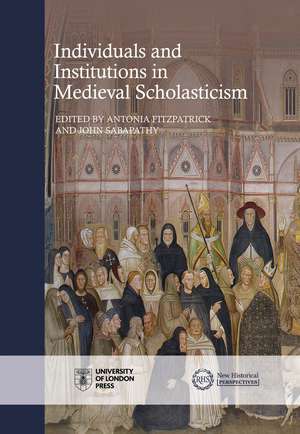Individuals and Institutions in Medieval Scholasticism: New Historical Perspectives
Editat de Antonia Fitzpatrick, John Sabapathyen Limba Engleză Paperback – 3 dec 2020
Din seria New Historical Perspectives
-
 Preț: 320.10 lei
Preț: 320.10 lei -
 Preț: 288.49 lei
Preț: 288.49 lei -
 Preț: 393.69 lei
Preț: 393.69 lei - 18%
 Preț: 637.36 lei
Preț: 637.36 lei -
 Preț: 393.30 lei
Preț: 393.30 lei -
 Preț: 281.14 lei
Preț: 281.14 lei -
 Preț: 282.50 lei
Preț: 282.50 lei -
 Preț: 294.43 lei
Preț: 294.43 lei - 23%
 Preț: 596.36 lei
Preț: 596.36 lei -
 Preț: 284.82 lei
Preț: 284.82 lei - 5%
 Preț: 266.04 lei
Preț: 266.04 lei - 23%
 Preț: 595.34 lei
Preț: 595.34 lei - 23%
 Preț: 595.34 lei
Preț: 595.34 lei -
 Preț: 435.66 lei
Preț: 435.66 lei -
 Preț: 441.12 lei
Preț: 441.12 lei - 23%
 Preț: 709.99 lei
Preț: 709.99 lei - 19%
 Preț: 584.69 lei
Preț: 584.69 lei - 23%
 Preț: 700.68 lei
Preț: 700.68 lei - 23%
 Preț: 707.92 lei
Preț: 707.92 lei -

Preț: 283.65 lei
Nou
Puncte Express: 425
Preț estimativ în valută:
54.28€ • 56.81$ • 45.18£
54.28€ • 56.81$ • 45.18£
Carte indisponibilă temporar
Doresc să fiu notificat când acest titlu va fi disponibil:
Se trimite...
Preluare comenzi: 021 569.72.76
Specificații
ISBN-13: 9781912702275
ISBN-10: 1912702274
Pagini: 300
Dimensiuni: 235 x 159 x 18 mm
Greutate: 0.43 kg
Ediția:1
Editura: University of London Press
Colecția University of London Press
Seria New Historical Perspectives
ISBN-10: 1912702274
Pagini: 300
Dimensiuni: 235 x 159 x 18 mm
Greutate: 0.43 kg
Ediția:1
Editura: University of London Press
Colecția University of London Press
Seria New Historical Perspectives
Notă biografică
Antonia Fitzpatrick is Departmental Lecturer in Medieval History at the University of Oxford and St. John's College, Oxford. She specializes in issues of individuality and identity in medieval philosophy. John Sabapathy is a Senior Lecturer in Medieval History at University College London, specializing in the comparative history of Europe and Christendom in the twelfth and thirteenth centuries.
Cuprins
Introduction: Antonia Fitzpatrick and John Sabapathy (Oxford and University
College London): Individuals and Institutions in Medieval Scholasticism
Part I. Individuals and intellectual traditions: construction and
criticism
1) Antonia Fitzpatrick (Oxford): The
Correctoria Corruptorii Fratris Thomae of Richard Knapwell, Robert of Orford,
and John Quidort
2) Blaise Dufal (Écoles des Hautes
Études en Sciences Sociales): Ambiguous authorities: St. Augustine and
scholastic identities
3) John Marenbon
(Cambridge): Pomponazzi
4) Matthew Kempshall
(Oxford): Individuals and the institution of history
Part II. Institutions and individuals: organizations and social
practices i. Individuals and organizations
1) Gert Melville (Dresden): The
charismatic and religious communities: some observations about an apparent
contradiction between individual and institution
2) Sylvain Piron (Écoles des Hautes
Études en Sciences Sociales): How much indeterminacy can an institution bear?
The case of the Franciscan vow
3) Peter Biller (York):
Rolando of Cremona and Inquisition
ii. Individuals and practices
4) John Sabapathy (University College
London): Robert of Courson and the ‘social systems’ of early thirteenth-century
institutions
5) Emily Corran (Oxford and University
of Kent): “Better to Let Scandal Arise than to Relinquish the Truth”: The cases
of conscience of the Masters of Paris in the thirteenth century
6) Cornelia Linde (Martin Luther
Universität, Halle-Wittenberg): The Friar Within. Robert Holcot’s Super
Quattuor Libros Sententiarum Questiones
7) Isabel Iribarren (Strasbourg): The
cult of the marriage of Joseph and Mary: The shaping of doctrinal novelty in
Jean Gerson’s Josephina (1414-1418)
Conclusions: David d’Avray (University College London)
College London): Individuals and Institutions in Medieval Scholasticism
Part I. Individuals and intellectual traditions: construction and
criticism
1) Antonia Fitzpatrick (Oxford): The
Correctoria Corruptorii Fratris Thomae of Richard Knapwell, Robert of Orford,
and John Quidort
2) Blaise Dufal (Écoles des Hautes
Études en Sciences Sociales): Ambiguous authorities: St. Augustine and
scholastic identities
3) John Marenbon
(Cambridge): Pomponazzi
4) Matthew Kempshall
(Oxford): Individuals and the institution of history
Part II. Institutions and individuals: organizations and social
practices i. Individuals and organizations
1) Gert Melville (Dresden): The
charismatic and religious communities: some observations about an apparent
contradiction between individual and institution
2) Sylvain Piron (Écoles des Hautes
Études en Sciences Sociales): How much indeterminacy can an institution bear?
The case of the Franciscan vow
3) Peter Biller (York):
Rolando of Cremona and Inquisition
ii. Individuals and practices
4) John Sabapathy (University College
London): Robert of Courson and the ‘social systems’ of early thirteenth-century
institutions
5) Emily Corran (Oxford and University
of Kent): “Better to Let Scandal Arise than to Relinquish the Truth”: The cases
of conscience of the Masters of Paris in the thirteenth century
6) Cornelia Linde (Martin Luther
Universität, Halle-Wittenberg): The Friar Within. Robert Holcot’s Super
Quattuor Libros Sententiarum Questiones
7) Isabel Iribarren (Strasbourg): The
cult of the marriage of Joseph and Mary: The shaping of doctrinal novelty in
Jean Gerson’s Josephina (1414-1418)
Conclusions: David d’Avray (University College London)
